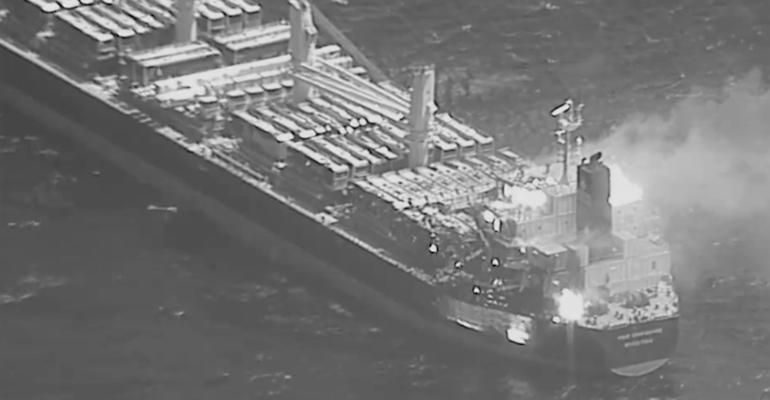The theme for this year’s Day of the Seafarer is safety. Seafarers are encouraged to share across social media their tips on creating a safe environment at sea under the hashtag #SafetyTipsAtSea, while the wider world is invited to thank seafarers for the role they play in enabling our daily lives and powering the world economy.
As we celebrate June 25 this year, seafaring is a profession under renewed pressure. Few safety tips will be useful in the face of missile and drone strikes.
Less than two weeks before the Day of the Seafarer, an attack on the dry bulk carrier Tutor in the Red Sea left one seafarer dead, and the survivors were forced to abandon the ship in a military evacuation. The following day a seafarer was seriously injured in a separate attack on Verbena, a ship which was also abandoned due to damage and fires. Three seafarers were killed in a missile attack on True Confidence in March.
Shipping organisations have united in calls to de-escalate the situation in the Red Sea and in appeals for action to prevent further attacks on merchant ships transiting the region. Houthi attacks on shipping continue, and have become more effective in recent weeks, despite daily reports of successful military strikes against Houthi radars, launch sites and UAVs.
Any day of recognition for seafarers must also recognise the risks they endure in keeping the world fed and clothed. The threat of attack may be the most pressing issue for crews travelling near the Yemeni coast, but there are broader pressures on seafaring as a profession.
Criminalisation of seafarers is a persistent risk, with crews routinely detained for extended periods after maritime accidents, or in situations where illegal cargo is found onboard. The crew of Dali, the ship which struck the Francis Scott Key Bridge in Baltimore, were all stuck on board for three months. While some of the 21 seafarers are set to return home, others will remain in Baltimore to assist with investigations.
Others have been and are kept for much longer and in much worse conditions.
Seafarers will be at the front line of shipping’s decarbonisation, a move into the unknown. As the industry works towards net zero by 2050, seafarers will need to adapt to new alternative fuels and the safety and operational changes they will bring. Quality training for crew will be essential in safely reducing carbon emissions, whether on ammonia bunkering procedures, operation of wind propulsion systems, or how to use the latest digital systems on the bridge.
The changes of decarbonisation come as shipping faces a growing crewing crisis due to a shortage of skilled seafarers. Attracting new talent to the sector is a priority, and one that must be matched with a focus on retaining skilled seafarers in order to reap the benefits of their expertise and pass on their invaluable knowledge to the next generation.
Complaints from seafarers in the quarterly Seafarers Happiness show the more routine issues faced by crews, including unjust treatment, predatory recruitment, discriminatory practices, and compromised safety standards onboard.
For those in the industry, the Day of the Seafarer is an opportunity to reflect on actions and initiatives that could improve the lot of seafarers and renew a commitment to improve. The Seafarers Happiness Index provides a helpful list of aspects of life at sea that can make a positive difference in their lives, including financial security, company support, connection to family, well-being improvements, better shore leave, good food and drink, training and development opportunities, and a positive work environment.
The Day of the Seafarer is a chance to get a message to everyone outside of shipping that they are fundamentally reliant on seafarers whether or not they are aware of it, and to draw attention to the risks and challenges involved in moving the vast majority of world trade.


